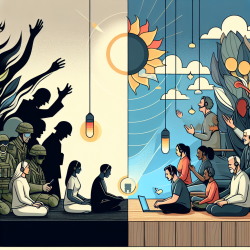Introduction
In the realm of therapeutic interventions, the intersection of Posttraumatic Stress Disorder (PTSD) and Substance Use Disorder (SUD) presents a complex challenge. Traditional therapies often struggle to address these co-occurring disorders effectively, leading to high dropout rates and limited success. However, recent research on the Virtual Mantram Repetition Program (MRP) offers a beacon of hope, demonstrating its feasibility and acceptability as a non-trauma-focused intervention for individuals with PTSD and SUD.
Understanding the Mantram Repetition Program
The Mantram Repetition Program is a mindfulness-based intervention that incorporates spiritual elements. Participants are encouraged to silently repeat a self-selected mantram, a spiritually significant word or phrase, to enhance concentration and attention. This practice aims to slow down thoughts and promote one-pointed attention, providing a practical tool for managing symptoms associated with PTSD and SUD.
Key Findings from the Study
- Feasibility and Acceptability: The study reported an impressive 81.4% retention rate among participants, highlighting the program's feasibility and acceptability. The virtual delivery of the program was particularly appreciated, offering a safe and accessible environment for participants.
- Practical Mindfulness Tool: Participants found the mantram repetition to be a practical mindfulness tool that could be used anywhere, unlike many meditation techniques. This flexibility allowed participants to manage stress, substance cravings, and PTSD symptoms effectively.
- Enhanced Engagement: The small group format fostered a sense of community and encouraged open discussions, enhancing participants' engagement with the program.
Implications for Practitioners
For practitioners, the findings from this study underscore the potential of virtual interventions like the Mantram Repetition Program in addressing the unique challenges of PTSD and SUD. Here are some practical takeaways:
- Consider Virtual Platforms: The success of the virtual MRP suggests that online platforms can effectively deliver therapeutic interventions, especially for individuals with mobility issues or geographical constraints.
- Integrate Mindfulness Practices: Incorporating mindfulness practices like mantram repetition can provide clients with practical tools to manage symptoms and improve treatment outcomes.
- Encourage Community Building: Small group formats can foster a sense of community, encouraging participants to share experiences and support each other, which can enhance treatment engagement and retention.
Encouraging Further Research
While the study provides promising evidence for the feasibility and acceptability of the virtual MRP, further research is needed to compare its efficacy with other interventions. Longitudinal trials could provide valuable insights into the long-term benefits of this program and its potential integration into standard therapeutic practices.
Conclusion
The Virtual Mantram Repetition Program represents a promising non-trauma-focused treatment option for individuals with PTSD and SUD. Its feasibility, acceptability, and practicality make it a valuable addition to the therapeutic landscape. As practitioners, embracing innovative interventions like the MRP can lead to improved outcomes for clients facing the dual challenges of PTSD and SUD.
To read the original research paper, please follow this link: The acceptability and feasibility of a virtual mantram program for patients with posttraumatic stress disorder and substance use disorders: mixed method results.










